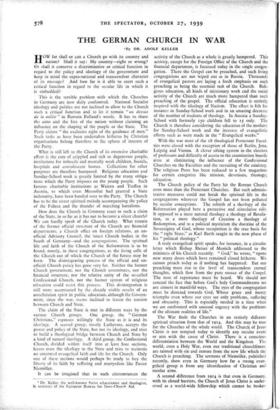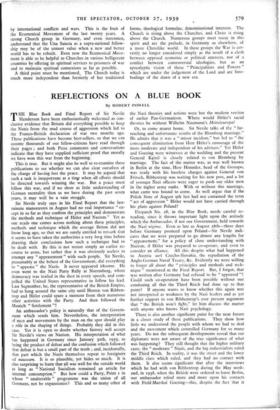THE GERMAN CHURCH IN WAR
*By DR. ADOLF KELLER
HOW far shall or can a Church go with its country and nation? Shall it say: My country—right or wrong? Or shall it conserve a discriminative or critical function in regard to the policy and ideology of the government and keep in mind the supra-national and transcendent character of its message? And how far is it able to exert such a critical function in regard to the secular life in which it is embedded?
This is the terrible problem with which the Churches in Germany are now daily confronted. National Socialist ideology and politics are not inclined to allow to the Church such a critical function and to let it remain "au dessus de la melee " in Romain Rolland's words. It has to share the aims and the fate of the nation without claiming an influence on the shaping of the people or the State. The Party claims " the exclusive right of the guidance of men." Such tasks as have been undertaken hitherto by Christian organisations belong therefore to the sphere of interest of the Party.
What is still left to the Church of its extensive charitable effort is the care of crippled and sick or degenerate people, institutions for imbecile and mentally weak children, hostels, hospitals and convalescent homes. Collections for other purposes are therefore hampered. Religious education and Sunday-School work is greatly limited by the many obliga- tions which the Party imposes on the young people. Such famous charitable institutions as Waiern and Treffen in Austria, to which even Mussolini had granted a State indemnity, have been handed over to the Party. The Church has to be the sweet spiritual melody accompanying the policy of the Fiihreg and the thunder of marching battalions.
How does the Church in Germany react to such a claim of the State, in so far as it has not to become a silent church? We can hardly speak of the Church today. What remain of the former official structure of the Church are financial departments, a Church office on foreign relations, an un- official Advisory Council, the intact Church bodies in the South of Germany—and the congregations. The spiritual life and faith of the Church of the Reformation is to be found, mostly, in these congregations, as the living cells of the Church out of which the Church of the future may be born. The disintegrating process of the official and un- official Church policy has gone very far. Neither the former Church government, nor the Church committees, nor the financial structure, nor the relative unity of the so-called Confessional Church, nor the former system of religious education could resist this process. This disintegration is still more accentuated by the already visible results of an antichristian spirit in public education, although the Govern- ment, since the war, seems inclined to lessen the tension between Church and State.
The claim of the State is met in different ways by the various Church groups. One group, the " German Christians,' espouses willingly the State as it is and its ideology. A second group, mostly Lutherans, accepts the power and policy of the State, but not its ideology, and tries to build a theological bridge between Church and State by a kind of natural theology. A third group, the Confessional Church, divided within itself into at least four sections, leaves even the ideology to the State and tries to maintain an untainted evangelical faith and life for the Church. Only one of these sections would perhaps be ready to buy the liberty of its faith by suffering and martyrdom like Pastor Niemoller.
It can be imagined that in such circumstances the * Dr. Keller. the well-known Swiss educationist and theologian, is secretary of the European Bureau for Inter-Citurch Aid. activity of the Church as a whole is greatly hampered. This activity, except for the Foreign Office of the Church and the financial department, is focussed today in the single congre- gation. There the Gospel can be preached, and such living congregations are not 'wiped out as in Russia. Thousands of evangelical pastors are laying a fresh emphasis on such preaching as being the essential task of the Church. Reli- gious education, all kinds of missionary work and the social activity of the Church are much more hampered than such preaching of the gospel. The official education is entirely inspired with the ideology of Nazism. The effect is felt for instance in Sunday-School work and in an amazing decrease of the number of students of theology. In Austria a Sunday- School with formerly 15o children fell to 15 only. The Church is therefore considering the education of the mothers for Sunday-School work and the increase of evangelistic efforts such as were made in the " Evangelical weeks."
With the war most of the IS theological Protestant Facul- ties were closed with the exception of those of Berlin, Jena, Leipzig and Vienna. A clever sifting system in the election of professors and difficulty of access to the examination boards aims at eliminating the influence of the Confessional Churches on the Faculties and the recruiting of the ministry. The religious Press has been reduced to a few magazines for certain categories like mission, devotions, theology, education.
The Church policy of the Party hit the Roman Church even more than the Protestant Churches. But such adminis- trative measures could not break the spiritual life in the congregations wherever the Gospel has not been polluted by secular conceptions. The rebirth of a theology of the Reformation played here a protective and stimulative role. It opposed to a mere natural theology a theology of Revela- tion, to a mere theology of Creation a theology of Redemption, and to a political mysticism the doctrine of the Sovereignty of God, whose recognition is the true basis for the " right State," as Karl Barth taught in the new phase of his " political theology."
A truly evangelical spirit speaks, for instance, in a circular letter which Bishop Meiser of Munich addressed to the ministers of his Church recently. " God," he wrote, " opens now many doors which have remained closed hitherto. We cannot preach today as if nothing has happened. But our preaching must rise to the level of transcendent eternal thoughts, which flow from the pure source of the Gospel. The note of repentance must be heard. We should not conceal the fact that before God's holy Commandments we are sinners in manifold ways. The eyes of the congregation must be directed towards God, Whose grace and mercy triumphs even where our eyes see only problems, suffering and obscurity. This is especially needed in a time when we are confronted with unusual urgency with the problems of the ultimate realities of life."
The War finds the Churches in an entirely different spiritual situation from that of 1914. And this may be true for the Churches of the whole world. The Church of Jesus Christ is not tempted today to identify any secular event or aim with the cause of Christ. There is a conscious differentiation between the World and the Kingdom. The world, even a Holy War, even our traditional churchliness, are tainted with sin and remote from the new life which the Church is preaching. The sermons of Niemiiller, published recently, show even in Germany how far a strong evan- gelical group is from any identification of Christian and secular aims.
A second difference from 1914 is that even in Germany, with its closed barriers, the Church of Jesus Christ is under- stood as a world-wide fellowship which cannot be broken by international conflicts and wars. This is the fruit of the Ecumenical Movement of the last twenty years. A strong Church group in Germany, and even statesmen, understand that the Una Sancta as a supra-national fellow- ship may be of the utmost value when a new and better world has to be rebuilt. Even now the Ecumenical Move- ment is able to be helpful to Churches in various belligerent countries by offering its spiritual services to prisoners of war and to maintain spiritual connexions as far as possible.
A third point must be mentioned.. The Church today is much more independent than formerly of her traditional forms, theological formulae, denominational interests. The Church is rising above the Churches, and Christ is rising above the Church. Numerous groups meet today in this spirit and are the prelude, in Germany as elsewhere, of a more Christlike world. In these groups the War is cer- tainly no longer considered simply as the result of a clash between opposed economic or political interests, nor of a conflict between controversial ideologies, but as an apocalyptic vision of those " Principalities and Powers " which are under the judgement of the Lord and are fore- bodings of the dawn of a new era.









































 Previous page
Previous page